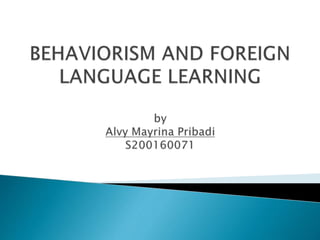
Behaviorism and foreign language learning
- 2. WHAT IS BEHAVIORISM? KEY FIGURES APPLICATION IN LANGUANGE LEARNING
- 3. - Behaviorism focuses on the study of overt behaviors that can be observed and measured. - It views that mind is a “black box” in the sense that response to stimulus can be observed quantitatively, ignoring the possibility of cognitive.
- 4. PAVLOV - He conducted a series of experiments by training a dog to salivate when hearing a turning fork. Then it is known as classical conditioning
- 5. Before Conditioning Unconditioned stimulus Unconditioned response Neutral stimulus No response
- 7. Conditioning stimulus-response behavior • The founder of behaviorism • Adopted Pavlov’s classical conditioning to explain all types of learning. •He rejected mentalistic notion of innateness and instinct •He believes that by the process of conditioning we can built stimulus-response connections.
- 8. - His work is often referred to as connectionism, neural connection Learning Forget - According to him, learning is the process of forming association or bonds. stimulus response Stamping in Stamping out
- 9. Thorndike proposed 3 laws of learning 1. Law of Readiness or Law of tendency - a preparation of action - organism will learn only when he/she is physically and mentally ready for it 2. Law of exercise - practice/drill helps in increasing learning efficiency 3. Law of effect - the greater of the satisfaction, the strong motive to learn will be
- 10. Skinner created new concept called Operant Conditioning/Instrumental Conditioning He called Pavlov’s conditioning Respondent Conditioning What is the difference?
- 11. e.g. Crying can be either Respondent or Operant responsestimuli consequence Respondent Conditioning (Pavlov) Operant Conditioning (Skinner) Stimuli precede response Consequences follow response
- 12. Stimulus Organism (Human Being) Response Behavior Reinforcement Negative Reinforcement Behavior likely to occur again and become habit Behavior not likely to occur again
- 13. In 1950s and 1960s, the learning theory of Behaviorism underpinned the used of Audioligual Method (ALM) on language teaching, with three crucial learning elements: 1. Stimulus 2. Response 3. Reinforcement
- 14. 1. Repetition 2. Inflection 3. Replacement 4. Restatement 5. Completion 6. Transposition 7. Expansion 8. Contraction 9. Transformation 10. Integration 11. Rejoinder 12. Restoration • The classroom environment is arranged with mimicry, memorization, and pattern drills. • Brook(1964: 156-61) proposed some various pattern drills used in ALM, as follows:
- 15. Likewise the Direct Method, Audiolingual believes that language is primarily speech. Brooks as quoted by Richards and Rodgers (2002) say, “Language is primarily what is spoken and only secondarily what is written.” So, how to teach writing by using ALM?
- 16. In ALM teaching writing skill is always dependent
- 17. At the beginning level, writing is purely imitative and consists of little more than copying out sentences that have been practiced. At the advanced level, students may develop by using some variations in using the structures that have been previously learned. Richards and Rodgers (2002) write, “As proficiency increases, students may write out variations of structural items they have practiced or write short compositions on given topics with the help of framing questions, which will guide their use of the language.”
- 18. According to Behaviorism theory, “Learning is habit formation”
- 19. Thank you…